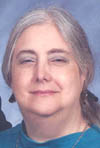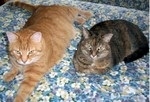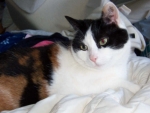Post
by MarylandCPAPer » Mon Apr 26, 2010 11:33 pm
Hi Stephen,
Good luck on your titration! I am still learning, but here are a few suggestions based on my sleep study last December and my CPAP /APAP treatment since then. CPAP /APAP treatment takes a little bit of an adjustment. None of us expected to need to sleep with a mask and hose to help us sleep better, but once you work out the settings and mask that are best for you, CPAP/ APAP likely will become an easy part of your nightly routine and the daytime benefits you feel will make you want to continue treatment.
While you are at the sleep center for the titration, I would try out nasal pillows masks, as well as a nasal mask and a full-face mask. You may find your preference surprises you. Opus 360, Breeze, Swift LT and Swift FX are among the popular nasal pillows masks,and there are many others.
I woke up with a dry mouth after titration with an Optilife nasal pillows mask, which they said indicated mouth breathing, so they ordered a chin strap. However, the titration was done without a humidifier on the CPAP machine, which I think also caused my nose and throat to be dry. I have found that my mouth stays closed while using nasal pillows without a chinstrap and I don't wake up with dry mouth any more. I am claustropohic and have not yet used either a nasal mask or a full-face mask, but I am doing fine with CPAP/APAP treatment using a nasal pillows mask. I have tried on the other types of masks but so far haven't needed them.
If you are a side-sleeper, I would suggest considering the Breeze nasal pillows mask, as there is nothing touching your face except the nasal pillows and you can use a regular bed pillow. However, no one mask is the right one for all of us, due to the shape of our faces, nares (nostrils), and positional preferences, so try on as many masks as you can until you find one that you find comfortable.
Finding the right mask, as well as the right pressure settings, are the main challenges most of us have had to deal with in getting used to CPAP /APAP treatment but once you have a comfortable mask and settings, you are likely to find that you are able to get more restful sleep and feel healthier and more energetic overall. It is worth the effort!!
At home, if not during the titration, I would try using the humidifier that comes with your CPAP/APAP machine. Even though your state's climate may be humid, the air coming through the CPAP can be very drying to the nose and mouth. I do not notice any humidity in the air I'm breathing from the CPAP machine, even with the humidifier set at the highest setting, but it evidently helps my nose and mouth to stay hydrated and more comfortable. I tried CPAP the first night without humidification and found it to be intolerable (not to speak of forgetting to use the ramp and feeling like I had attached a leaf blower to my nose and having my nose run for the next 24 hours) after using CPAP at 13 cm for all of 38 minutes that first night. I was told having my nose run after starting CPAP was good, as the sinuses were clearing out and that would help with breathing during sleep. The runny nose stopped after 24 hours and hasn't come back.
I switched to APAP after a month of a constant setting of CPAP. I have been using APAP for about three monhts. I find that I get much better sleep with APAP, which the sleep specialist prescribed for a range of 5-15, when my original constant CPAP pressure prescription was for 13, with a 20-minute ramp of 4. I have since changed my APAP setting to 6-15 and set it to ramp for 5 minutes. The ramp allows time to adjust to having the mask on before the air pressure rises, although sometimes it doesn't rise that much during the night. The pressure that is comfortable for me seems to vary greatly night to night, perhaps depending on sleep position and congestion variations.
I would ask, based on your titration results, what APAP range the sleep specialist would recommend. A range of 5-20 sounds way too wide. However, my personal experience indicates that a range of just a few cm can be too narrow, as well. Your sleep study results are key to determining the proper range for you.
At the sleep study and during my use of CPAP, I have continued to use the medications / supplements that helped me sleep before CPAP, which include evening doses of an NSAID for pain, an anti-depressant that is supposed to help with fibromyalgia, and an anti-anxiety medicine. If certain herbs have worked for you to help you sleep pre-CPAP/APAP, I would continue with what works for you. It sounds like, with your stress levels, you may benefit from an anti-anxiety medication which may help both during the day and during sleep. I thought I slept soundly during the sleep study with no sleep apnea, but found out I had an AHI rate of 87 AHIs/hour for the first two hours, after which they woke me up and put a nasal pillows mask on me. I slept soundly for the next four hours while they did the titration. The process was relatively uneventful and I wish I had done it a lot sooner. I hope you have a similar good experience. Think positive! This night of sleep could change your life permanently for the better.
Try to get as comfortable during the titration as possible. The sleep center mentioned bringing my own pillow as an option. I would try to sleep in your usual sleep positions and as "normally" (for you_ as possible, to try to make the titration results as useful as possible. As mentioned before, a titration gives a snapshot of one night's sleep, and with an APAP and data capable machine, you can refine the results from the titration. The titration measures many things that you cannot measure every night at home but which are useful for determining your treatment needs, so try to do everything you can to make your titration as comfortable and like a normal night of sleep as possible.
Best wishes for a useful titration experience and many relaxed nights of restful sleep ahead.
Started CPAP 12/18/09 Pressure 13. Changed to APAP 1/18/10, Pressure 10-16. 4/2014:Switched to AirFit P10 mask. PR System One REMstar Auto Series 550 with A-Flex for 5.5 years. 7/2015 to present: AirSense 10 AutoSet FOR HER. Range: 10-20












